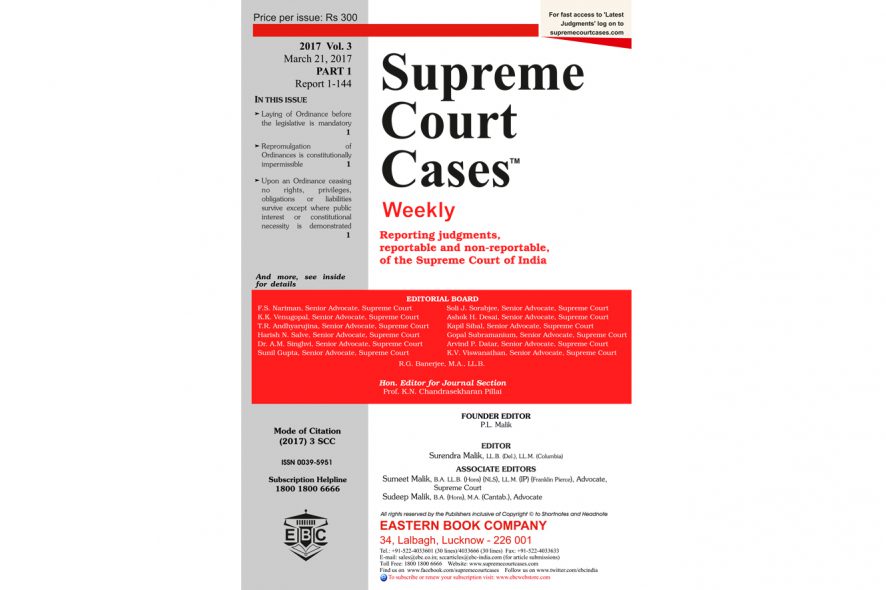Constitution of India — Art. 136 — Grant/Dismissal of SLP — Dismissal of SLP — When warranted: Supreme Court most focus on significant and important cases. Exercise of power while entertaining SLPs is purely discretionary. Availability of alternative remedies and mounting pendency of cases coupled with relative insignificance of legal injury, are factors to be weighed while entertaining SLPs. [Reena Suresh Alhat v. State of Maharashtra, (2017) 3 SCC 119]
Constitution of India — Arts. 213 & 123 and Arts. 249(3), 250(2), 357, 358(1) & 359(1-A) — Obliteration of rights, privileges, obligations or liabilities under an Ordinance upon its ceasing to operate: Laying of Ordinance before the legislative is mandatory. Repromulgation of Ordinances is constitutionally impermissible. Upon an Ordinance ceasing, no rights, privileges, obligations or liabilities survive except where pubic interest or constitutional necessity is demonstrated. [Krishna Kumar Singh v. State of Bihar, (2017) 3 SCC 1]
Constitution of India — Arts. 226 and 32: As interim order have serious consequences on main relief sought i.e. private university (till date) would henceforth be treated by UGC as State University, said interim order stayed and status quo directed to be maintained till writ petition is disposed of by High Court. [University Grants Commission v. Maharishi Mahesh Yogi Vedic Vishwavidyalaya, (2017) 3 SCC 114]
Criminal Procedure Code, 1973 — Ss. 239 and 482 and S. 227 — Discharge — Proper forum for: Appropriate application under S. 239 must be filed before Magistrate. It is for Magistrate to consider contentions regarding discharge therein. [Umesh v. State of Kerala, (2017) 3 SCC 112]
Employees’ Provident Funds and Miscellaneous Provisions Act, 1952 — S. 14-B — Imposition of damages for default in payment of provident fund dues: Since presence or absence of mens rea and/or actus reus would be a determinative factor in imposing damages under S. 14-B and High Court or appellate authority or original authority found no mens rea and/or actus reus, respondent(s) could not be held liable under S. 14-B. [Provident Fund Commr. v. RSL Textiles (India) (P) Ltd., (2017) 3 SCC 110]
Land Acquisition Act, 1894 — Ss. 4(1) & 6 and 13-A: Once award is passed, there is no question of any correction in notification under S. 4(1) or declaration under S. 6. S. 13-A provides for correction of clerical mistakes in award and that too only within six months. There is no question of an award being passed in respect of a property, for which there is no notification under S. 4(1) and consequently, declaration under S. 6. [State of U.P. v. Abdul Ali, (2017) 3 SCC 108]
Limitation Act, 1963 — Art. 134 and S. 15 — Sale in execution of decree — “When sale becomes absolute”: Sale becomes absolute on termination of proceedings initiated to set aside order of confirmation of sale as per Or. 21 R. 92(1) CPC, not on mere passing of such confirmation order. [United Finance Corpn. v. M.S.M. Haneefa, (2017) 3 SCC 123]
Preventive Detention — Grounds of detention — Relevancy of/Validity of/Inconsistencies in/Defects in grounds: Where detention order is based on more than one grounds, independent of each other, detention order would survive even if one of the grounds is found to be non-existing or legally unsustainable. However, where detention order is founded on one composite ground it would be vitiated if such ground is found fault with. Further held, “grounds” are basic facts on which conclusions are founded which are different from subsidiary facts or further particulars of basic facts. [Gautam Jain v. Union of India, (2017) 3 SCC 133]
Tort Law — Negligence — Compensation — Quantification of, without material evidence and based on assumptions and presumptions: In this case of electrocution suffered by 8 yr old boy, which resulted in amputation of both arms, High Court was correct in holding that victim would have earned about Rs 30,000 p.m. as these conclusions are based on proper materials, hence, no interference therein called for. But award of compensation of (i) Rs 10,00,000 towards loss of companionship, life amenities/pleasure and happiness; (ii) Rs 10,00,000 for pain and suffering, mental distress, trauma and discomfort and inconvenience; (iii) Rs 10,00,000 towards attendant/nursing expenses; and (iv) Rs 5,00,000 for securing artificial/robotic limbs and future medical expenses, are on the higher side. There is no evidence to support award of compensation under these heads and such quantification is based on assumptions and presumptions. Entitlement for compensation under these heads is one thing and quantum of compensation under these heads is another thing, hence, sum reduced from Rs 1,25,00,000 to Rs 90,00,000 with 6% interest. [State of H.P. v. Naval Kumar, (2017) 3 SCC 115]






